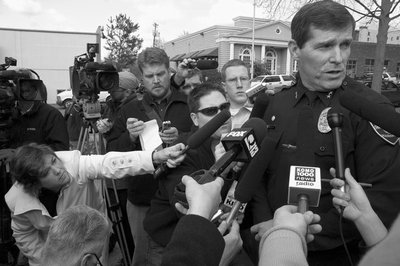July 18, 2007
New consensus on trauma support for journalists and other first responders
Should journalists and other witnesses of traumatic events receive mandatory counseling or debriefing in the aftermath?
No, concludes an article published July 1 in the American Journal of Psychiatry.
The Dart Center for Journalism and Trauma, based at the University of Washington, initiated a two-year discussion on the topic between British trauma psychiatrist and researcher Jonathan Bisson of Cardiff University and psychologist George Everly of Johns Hopkins University and the Critical Incident Stress Foundation based in suburban Washington, D.C.
Their resulting article agrees on practical support rather than mandatory counseling. Experts have disagreed whether responders, including journalists, should be required to receive counseling after traumatic events.
“News organizations are wondering how best to prevent emotional injury to journalists, whether covering war, disasters or day-to-day crime, violence and accidents,” said Dart Center Executive Director Bruce Shapiro. “This joint paper provides important guidance, and we are pleased to have helped these experts find common ground.”
The Dart Center promotes effective and ethical reporting on victims of violence and tragedy, and offers support for reporters who cover such stories.
Bisson and Everly use a case study of a fictional journalist in the aftermath of a bomb attack. They argue for pragmatism, empathy and information about possible reactions — how responders can help themselves and get support from family and community, followed by formal psychological intervention if necessary.
In the 1980s, Everly and former US fireman Jeffrey Mitchell developed Critical Incident Stress Management, more widely popularized as Critical Incident Stress Debriefing.
Bisson, senior lecturer in psychiatry at Cardiff University in Wales, was one of the British government’s key advisers for Guidelines of the National Institute for Clinical Excellence (2005), which explicitly discourage routine debriefing after traumatic events.
“People cope with stress in differing ways,” write Bisson and Everly in their paper, “and no formal intervention should be mandated.
“It is important that provisions be made for individuals to obtain the appropriate early support after a traumatic event,” they continue. “However, any early intervention approach should be based on an accurate and current assessment of need.”
In the case study, Bisson and Everly say that despite the journalist’s significant initial distress after covering the aftermath of the bomb, there was no indication that an early formal intervention would have helped.
They go on, however, to highlight awareness training and peer support which helped the journalist and his colleagues recognize some weeks afterward that he had become withdrawn, irritable and hypervigilant.
Eventually, a physician diagnosed acute post-traumatic stress disorder, and treated him with 10 sessions of therapy.
The article is available at: http://ajp.psychiatryonline.org/cgi/content/full/164/7/1016
###
For more information, contact Bruce Shapiro, executive director, Dart Center for Journalism and Trauma, University of Washington, (206) 616-4281, bruce.shapiro@dartcenter.org
In the UK: Mark Brayne, Director, Dart Centre in Europe, (020) 81233549, mbrayne@dartcenter.org



